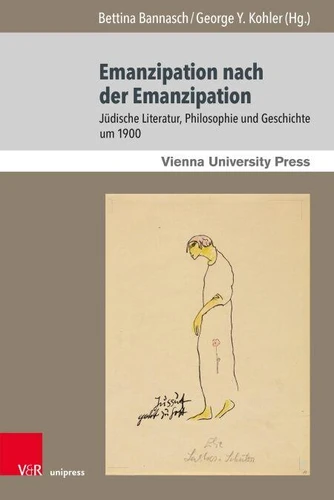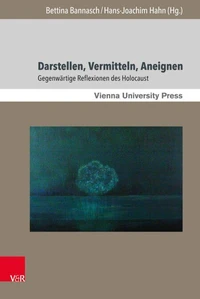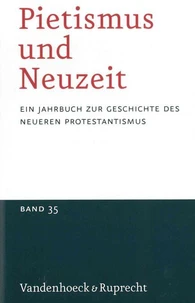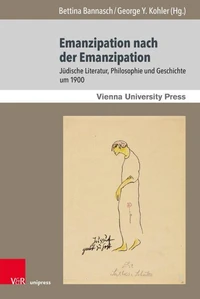- Accueil /
- Bettina Bannasch
Bettina Bannasch

Dernière sortie
Emanzipation nach der Emanzipation
Der Band setzt dort an, wo das »Zeitalter der Emanzipation« endet und macht es sich zur Aufgabe, die zeitübergreifende, ungelöste Spannung aller emanzipativen Hoffnungen für die Jahre im ersten Drittel des 20. Jahrhunderts unter philosophischen, psychologischen und ästhetischen Perspektiven genauer zu systematisieren. Unterschiedliche disziplinäre Zugänge eröffnen dabei neue Perspektiven auf den Niederschlag, den diese Spannung in den unterschiedlichen künstlerischen, religiösen, politischen und literarischen Strömungen, in bildkünstlerischen und museumsdidaktischen Programmen findet - unter dem spezifischen Blickwinkel des Emanzipationsprozesses und dessen Einschätzung als gelungenem oder gescheitertem Projekt.
The volume begins where for German Judaism the "Age of Emancipation" ends.
It sets itself the task of systematizing the unresolved tension within all emancipatory hopes - for the first third of the 20th century. In more detail than known before different disciplinary approaches open up new perspectives on the reflections that this tension finds in the different artistic, religious, political and literary movements, in visual art and museum didactic programs. From philosophical, psychological and aesthetic viewpoints the volume analyses the results of the emancipation process and its assessment, in the eyes of German Jews, as a successful or failed project.
It sets itself the task of systematizing the unresolved tension within all emancipatory hopes - for the first third of the 20th century. In more detail than known before different disciplinary approaches open up new perspectives on the reflections that this tension finds in the different artistic, religious, political and literary movements, in visual art and museum didactic programs. From philosophical, psychological and aesthetic viewpoints the volume analyses the results of the emancipation process and its assessment, in the eyes of German Jews, as a successful or failed project.
Der Band setzt dort an, wo das »Zeitalter der Emanzipation« endet und macht es sich zur Aufgabe, die zeitübergreifende, ungelöste Spannung aller emanzipativen Hoffnungen für die Jahre im ersten Drittel des 20. Jahrhunderts unter philosophischen, psychologischen und ästhetischen Perspektiven genauer zu systematisieren. Unterschiedliche disziplinäre Zugänge eröffnen dabei neue Perspektiven auf den Niederschlag, den diese Spannung in den unterschiedlichen künstlerischen, religiösen, politischen und literarischen Strömungen, in bildkünstlerischen und museumsdidaktischen Programmen findet - unter dem spezifischen Blickwinkel des Emanzipationsprozesses und dessen Einschätzung als gelungenem oder gescheitertem Projekt.
The volume begins where for German Judaism the "Age of Emancipation" ends.
It sets itself the task of systematizing the unresolved tension within all emancipatory hopes - for the first third of the 20th century. In more detail than known before different disciplinary approaches open up new perspectives on the reflections that this tension finds in the different artistic, religious, political and literary movements, in visual art and museum didactic programs. From philosophical, psychological and aesthetic viewpoints the volume analyses the results of the emancipation process and its assessment, in the eyes of German Jews, as a successful or failed project.
It sets itself the task of systematizing the unresolved tension within all emancipatory hopes - for the first third of the 20th century. In more detail than known before different disciplinary approaches open up new perspectives on the reflections that this tension finds in the different artistic, religious, political and literary movements, in visual art and museum didactic programs. From philosophical, psychological and aesthetic viewpoints the volume analyses the results of the emancipation process and its assessment, in the eyes of German Jews, as a successful or failed project.
Les livres de Bettina Bannasch

Formen des Magischen Realismus und der Jüdischen Renaissance
Bettina Bannasch, Petro Rychlo, Katharina Baur, Georg B. Deutsch
E-book
45,00 €

Darstellen, Vermitteln, Aneignen. Gegenwärtige Reflexionen des Holocaust
Bettina Bannasch, Hans-Joachim Hahn, Tobias von Borcke, Ole Frahm
E-book
85,00 €

Rückkehrerzählungen. Über die (Un - )Möglichkeit nach 1945 als Jude in Deutschland zu leben
Bettina Bannasch, Michael Rupp, Katharina Baur, Marguerite Markgraf, Jan Kühne
E-book
49,00 €

Pietismus und Neuzeit Band 35 – 2009. Ein Jahrbuch zur Geschichte des neueren Protestantismus
Udo Sträter, Bettina Bannasch, Daniel Cyranka, Leigh T. I. Penman, Marianne Schröter
E-book
60,00 €
